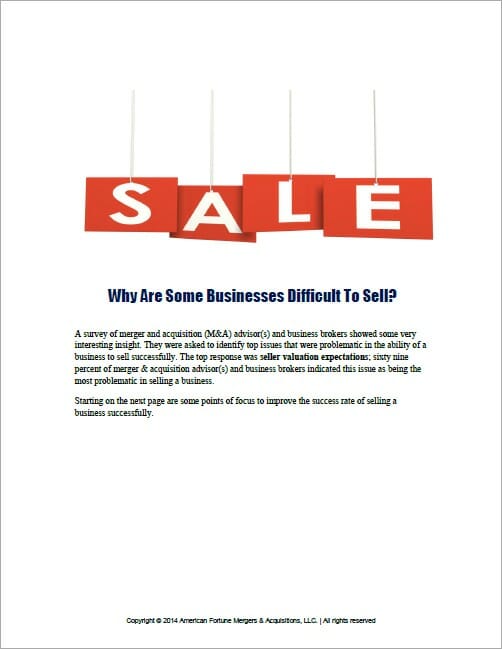M&A Perspectives on Selling a Business
Recently, M&A Press released a study on reasons businesses were sold. They determined, based on the results of that study, that the reason an owner would sell a business had a direct effect on the probability of their business selling at all. Brian Mazar, CEO of American Fortune Mergers and Acquisitions, shares his comments (and issues a challenge) on the released information.
This commentary explores the m&a perspective in selling businesses.
The study listed seven reasons a business owner would state to a potential buyer about why they were selling their business. These reasons (and there probability of sale) were: retirement (30-35%), health problems or a death (25-30%), partnership/family problems or divorce (15-20%), burn-out/other business investments (15-20%), under-capitalization (10-15%), insufficient profits (5-10%), and profit motivated (0-5%).
“All of these reasons are valid for selling a business,” explains Mazar, “but one needs to consider how the information will be interpreted by the buyer.” In every sale there are two perspectives a buyer considers. The first is their emotional involvement in the deal; how do they “feel” about the business. The second perspective is how successful they think the business will be once they own it. The key, according to Mazar, is to have them feel good about both perspectives.
“For the emotional component, business sale reasons such as retirement, health issues or death, or partnership/family problems or divorce are ok for a buyer,” shares Mazar. “After all, we are all human.” And if a buyer hasn’t experienced any of these issues yet, it is only a matter of time before they do. This innate compassion for personal reasons typically creates a green light for buyers and they rarely reconsider their purchase if one of these reasons is given. On the other hand, buyers are going to throw-up caution flags if a seller’s reason is not one that can play to their emotions. Reasons such as burnout/other investments, under-capitalization, insufficient profits, or profit motivated have little-to-no emotional weight and will, naturally, make the deal harder to close.
The prospective owner is also going to heavily weigh how successful they think the business will be once they own it. To determine this, a buyer will be interested in how the company has been run to this point. What is morale? How happy are clients? How involved are the owners? Is the business organized? What is the company’s profitability? There are many different ways a business owner will go about answering these questions, but one indicator will definitely be the reason a business is up for sale. “Don’t get me wrong, someone getting ready to retire might very-well have a poorly run business,” admits Mazar, “but the chances of inheriting a poorly run business are less with a retiring owner than with an owner who is burnout, facing poor profits or who is only interested in profiting from the sale.”
“Some might argue that this information is obvious,” Mazar shares. “Even if that’s the case, m&a companies need to see this so they can advise their clients appropriately. But what concerns me about this data is not the break-down in information; it is the low probability of sale percentage listed no matter what the reason for the sale is. The mergers and acquisitions industry can do better than this. When I look down a column and see that the highest probability for a business to sell in any given industry is 30%, than we are not doing our jobs as mergers and acquisition advisers,” Mazar concluded.
Mazar cites complacency as the issue. “It seems the norm in the industry is to just take a company to market, as is, and hope for the best. Fewer and m&a advisers and business brokers are grooming their client’s businesses for a successful sale.” He believes if advisers consistently took the time to organize their financial books, get a quality business valuation, document processes and procedures, and help set realistic expectations for the sellers the business sale success rate would double, at least. “At American Fortune Mergers and Acquisitions we sell over 90% of the businesses we take to market. We don’t use a magic formula, we just actively participate in each sale as if it were our own business. That, and we’re patient. The sale of a business doesn’t happen overnight and I find many of the mergers and acquisitions advisers and business brokers want that quick sale. That is what instigates their complacency.”
American Fortune Mergers and Acquisitions, LLC is a nation-wide firm that provides services in the areas of growth-to-exit planning, m&a and business valuations for businesses with revenues between $3 million and $50 million. American Fortune was founded by industry veteran Brian S. Mazar who developed a unique process that is sell-side driven. This process makes American Fortune different from most merger & acquisitions firms.
Advisers at American Fortune are not business brokers, they do not represent both sides of a deal and they refuse to follow industry standards just “because.” Their results are different too. Those who sell a business through American Fortune M&A receive better terms, higher selling prices and a true advocate when they sell a business. Due to this, American Fortune successfully sells their businesses at an average of 98% of the listed price.
Choose American Fortune as one of the best m&a companies in the USA.
By Brian S. Mazar, CBI, MBA
American Fortune Mergers and Acquisitions
fortunebta.com







